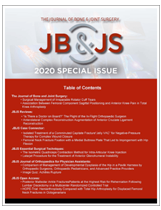Marc F. Swiontkowski, MD, assumes role as Editor-in-Chief

Marc F. Swiontkowski, MD (Editor-in-Chief, 2015-Present)
Leading by Example with a Focus on Excellence, Integrity, and Humanity
Marc F. Swiontkowski, MD (Editor-in-Chief, 2015-present) continues to carry on the proud tradition of his predecessors by leading the organization with an unwavering focus on excellence, adherence to the highest standards, an emphasis on evidence-based medicine, and the timely delivery of gold-standard orthopaedic content across all available platforms—while consistently emphasizing that the patient is at the heart of everything that we do. Dr. Swiontkowski’s tenure has been marked by a number of important initiatives and milestones, as described below:
- New Journals, Article Types, Features, Enhancements, and Educational Products:
- JBJS Open Access was launched in 2016 as an online-only, open access journal in order to expand the ability of the organization to publish basic-science and clinical findings as well as new research approaches with the potential to impact musculoskeletal disease and injury care worldwide.
- JBJS Case Connector has been reimagined as a robust database, with an ultimate goal of 10,000 cases, that will leverage technology for the purposes of (1) expanding the pool of unusual and rare cases, (2) allowing cases to be grouped for the purpose of clinical decision-making, and (3) serving as an “early warning system” for the detection of complications related to a particular device or procedure.
- “The Hub” is the redesigned JBJS website (jbjs.org), which now allows users to customize their experience, easily access content related to their subspecialty, and perform robust searches across all 6 journals in the JBJS family from a single location.
- “What’s Important” articles have been added as a feature of the Orthopaedic Forum. These short essays consist of powerful and poignant vignettes about life and career-changing experiences from the perspective of both clinicians and patients:
- Essays by clinicians tell a personal story about a high-impact lesson that they learned at some juncture in life that has altered their worldview, enhanced them personally, and positively affected the care that they provide as orthopaedic physicians.
- Essays by patients describe what it means to be (or care for a family member who is) a patient with musculoskeletal disease or injury.
- “Clinical Summaries” are concise synopses of the current knowledge on common orthopaedic conditions in specific subspecialty areas, with links to supporting studies, that represent a uniquely useful and evidence-based contribution to orthopaedic literature designed for the busy orthopaedic surgeon.
- “JBJS Clinical Classroom” is a powerful learning tool, based on adaptive-learning technology and state-of-the-art adult learning theory, that is designed to provide users with “the most efficient and effective way to study for initial credentialing and maintenance of certification examinations, earn CME credits, and periodically refresh your knowledge to provide the best possible patient care.”
- The “AOA Critical Issues in Education” channel within JBJS Open Access focuses on publishing articles on topics that are germane to the education of the medical student, resident, and fellow, including competency testing, simulation techniques, educational leave, the matching process, and preparation for certifying examinations.
- “Infographics” and “Video Summaries” have been introduced as a way to enhance selected articles with visual representations and/or short animations providing an engaging, easy-to-digest overview of the key findings.
- “Author Insights” videos consist of short introductory videos in which authors explain the main take-home points of their own recently published articles.
- Increased Engagement with Authors, Reviewers, Readers, and the Orthopaedic Community. During his tenure, Dr. Swiontkowski has taken a number of specific steps to show appreciation to those who help JBJS accomplish its mission of providing the community of musculoskeletal caregivers with the best information available to share with their patients when making treatment decisions.
- KUDOS. In 2015, JBJS partnered with KUDOS, a free, web-based service that enables authors to boost and measure the impact of their published work.
- The “Elite Reviewer” Program. In 2016, Dr. Swiontkowski created this program as a way to formally recognize the outstanding contributions of our best peer reviewers as indicated by specific criteria (reviewer response time, review quality, and the number of times that a reviewer accepts a request to review).
- Journal Statistics. Since 2017, Dr. Swiontkowski has written an annual editorial to update the JBJS community on relevant journal statistics from the previous year (e.g., numbers of submissions, acceptance rates, time to publication, indexing information, impact factor, social media hits, etc.).
- ORCID IDs. Since 2017, all corresponding authors have been required to have an ORCID ID (a unique identifier that links each author to their research activities and outputs) that is increasingly being required for grant applications and submissions worldwide.
- Publons. In 2019, JBJS provided access to Publons, a service that enables its peer reviewers to showcase their vital contributions to the scientific community by establishing a permanent personal profile that can be offered when submitting applications for funding or seeking appointments or promotions at the university, department, or health system level.
- JBJS Ambassador to the World. Throughout his tenure, Dr. Swiontkowski has traveled the world while serving as a roving ambassador for JBJS.
- Leadership by Example. During Dr. Swiontkowski’s tenure, JBJS has continued to lead the orthopaedic community in adopting and upholding the highest standards of scientific integrity in a number of key areas:
- Clinical Trial Registries. In 2016, JBJS joined with The Bone & Joint Journal and Clinical Orthopaedics and Related Research to begin requiring all randomized clinical trials (RCTs) to be prospectively registered in a publicly searchable clinical trials registry in order to be considered for review.
- Preprint Servers. In 2019, JBJS joined with Clinical Orthopaedics and Related Research, The Bone & Joint Journal, and the Journal of Orthopaedic Research in establishing a policy of not accepting clinical research manuscript submissions that have been posted to preprint servers prior to submission.
- Levels of Evidence. In a 2015 editorial, Dr. Swiontkowski (along with Robert G. Marx, MD, Deputy Editor for Evidence-Based Orthopaedics and Sean M. Wilson, BA) updated the Levels of Evidence definitions for JBJS articles to facilitate the process of determining the best evidence to answer a clinical question. In a 2016 editorial, Dr. Swiontkowski and Bruce J. Sangeorzan, MD, emphasized the continued importance of high-quality Level-III and IV cohort studies for providing guidance to treating physicians for uncommon disorders.
- Stem Cell Therapy. In 2020, JBJS joined with The International Society for Cell and Gene Therapy (ICST) and other organizations in supporting the use of cell and gene therapies that have been scientifically proven to be safe and efficacious while endorsing the condemnation of speculative cell-banking services in the absence of adequate scientific evidence.
- Adherence to International Publication Standards. Throughout Dr. Swiontkowski’s tenure, JBJS has continued to adhere to the highest standards of scholarly publishing set forth by leading international bodies, including the Committee on Publication Ethics (COPE) and the International Committee of Medical Journal Editors (ICMJE), and to require that authors adhere to CONSORT (Consolidated Standards of Reporting Trials) guidelines for RCTs, ARRIVE (Animal Research: Reporting of In Vivo Experiments) guidelines for animal studies, and PRISMA (Preferred Reporting Items for Systematic Reviews and Meta-Analyses) guidelines for systematic reviews and meta-analyses.
- Proactively Addressing Issues Facing the Orthopaedic Community. Throughout his tenure, Dr. Swiontkowski has highlighted the importance of taking the lead in addressing issues of importance to the orthopaedic community.
- Fragility Fractures. In a 2015 editorial, Dr. Swiontkowski, along with Kyle J. Jeray, MD, Associate Editor and AOA Own the Bone Committee Chair, emphasized the importance for orthopaedic surgeons to focus on the prevention of fragility fractures in patients with osteoporosis, noting that “we need to take ownership and to focus on fracture prevention in this high-risk population that has a sentinel event for which we are the primary caretakers.”
- Pain Management. In response to the opioid epidemic, JBJS took the lead in encouraging the orthopaedic community to focus on developing solutions to the management of acute and chronic pain related to musculoskeletal conditions. Specific steps included:
- In April 2019, Drs. Swiontkowski and Heckman wrote an editorial highlighting issues related to the scholarly approach to research in musculoskeletal pain management, noting that they hoped “to encourage our research community to focus on developing interventions that can be effective beyond the local or regional environment and to document their impact through carefully designed advanced cohort or randomized trial study designs.”
- In November 2019, with the support of an R13 grant from the National Institute of Arthritis, Musculoskeletal and Skin Diseases (NIAMS) and theJBJS Trustees, JBJS conducted a Pain Management Research Symposium that was attended by a diverse working group consisting of experienced researchers in the field of musculoskeletal pain management, orthopaedic journal editors, and Charles Washabaugh, PhD, the director of orthopaedicresearch at NIAMS
- In April 2020, JBJS published a series of papers based on the proceedings of the Symposium, along with a summary list of Recommendations for Pain Management, in a supplementary issue entitled “JBJS Supplement onPain Management Research.”
- COVID-19. In response to the COVID-19 pandemic, Dr. Swiontkowski took decisive steps to ensure that JBJS would provide the orthopaedic community with the most up-to-the-day information related to what is perhaps the greatest challenge facing the worldwide medical community in modern history. Specific steps included:
- Accelerating the peer-review process to ensure that important scientific manuscripts were posted online, free of charge, within 4 to 5 days after receipt.
- Providing up-to-the-week systematic reviews in collaboration with OrthoEvidence; clinical experiences from Wuhan, China; and well-considered opinion pieces such as “What’s Important” contributions to the JBJS Orthopaedic Forum.
- Continuing to maintain the highest editorial standards, despite the accelerated process, in order to assure readers that all published information related to COVID-19 is sound and reliable.
Click below for links to editorials written by Dr. Swiontkowski during his tenure as Editor-in-Chief (2014-present).



